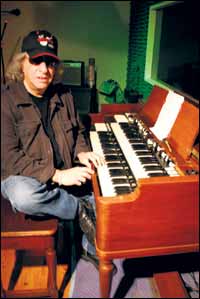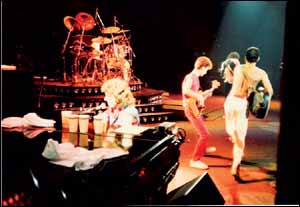|
PROFILE Fred has appeared on some of the greatest albums in rock history | ||
YOU probably won't recognise his name or face, but Fred Mandel has played on some of the biggest albums in rock history.
Despite appearing on chart toppers by Queen, Pink Floyd, Supertramp, Alice Cooper and Elton John, the affable Canadian keyboardist and guitarist is happy to remain in the background while his fellow musicians lap up the limelight. "I actually haven't been credited on some of the stuff I've worked on, but that's okay, because in my mind I've always been a writer and an artist," Fred told the Jewish Telegraph from his Los Angeles home. "I work on my own music too, but it has always been tough to say no when I get asked to work with other artists." He's played to sell-out stadiums with Queen and Elton John and has come along way from the south of Canada. Born in 1956 and raised up in Regina, Saskatchewan, Fred started to play the piano at the age of four and took up the guitar when he was eight. His was a musical household as his father was a pianist and he could immerse himself in his parents' record collection. It was, perhaps, his parents Clara and Henry's move to Toronto when he was 11 that influenced Fred's decision to pursue a career in music. "I just thought I'd end up working in Las Vegas and that would be it," he recalled. "But Toronto in the 1960s was a really happening place musically, a vibrant scene and maybe my career wouldn't have panned out the way it has had my parents not decided to move there. "It was guys like Steppenwolf and The James Gang which influenced my musical tastes." But Fred's parents were not too enamoured with their son's career direction. Of Russian Jewish descent, he was brought up in a fairly Orthodox home, attended cheder and was barmitzvah. He explained: "I don't think they were entirely surprised with my career choice and there was not an antagonistic attitude about it, but they thought I was performing recitals when I was doing gigs and didn't realise that I was playing in dives full of strippers." It was Fred's friendship with Canadian rock guitarist Domenic Troiano, which saw his musical world head upwards. He joined Troiano's band and record his album Burning at the Stake and then headed to Los Angeles and worked with guitarist and songwriter Dick Wagner, which led him to working with the eccentric Alice Cooper. Fred played on three of Cooper's albums: The Alice Cooper Show, Flush the Fashion and Special Forces in the late 1970s and early 1980s. Cooper - the son of a preacher - became renowned for his over-the-top concerts, but Fred insists that Cooper is a "pretty normal guy" off stage. He said: "There's a big separation between Alice the performer and Alice the person. "He an intelligent guy, really media-savvy and both of those attributes have helped to perpetuate his career. "You know, Bob Dylan called him one of music's most underrated songwriters and I think that's correct. "He's a godfather of heavy rock, but he always had the right melodies." However, Cooper's stage antics did lead to some hair-raising moments for Fred. He recalled: "One of the first gigs I did with him was in front of 70,000 people at the Anaheim Stadium in California and something went wrong and a quarter stick of dynamite blew up in front of me. "We had some pretty heavy crowds and had American Marines on either side of us for security. "We were tear-gassed in Indianapolis - perhaps the crowd didn't like my solos. "Another time there was a riot in Toronto because we announced that Alice wasn't well." And Fred's connection with producer Bob Ezrin led to him playing a B3 organ on a number of tracks for Pink Floyd's seminal album The Wall. "That was fun," he said. "I didn't get credited for what I did, sometimes session guys don't, and it was kind of funny because The Wall was a massive selling album. "But what could I do? I couldn't go round saying, 'yeah, I'm the guy that played on The Wall', there's loads of nutballs that have gone round saying that. "It's part of the nature of the game I'm in I suppose, but David Gilmour and Roger Waters did credit me later on." Waters is a noted supporter of the boycotts, sanctions and divestment campaign against Israel and Fred feels strongly about artists who decide not to perform in the Jewish state. Fred, whose father volunteered on a kibbutz, said: "I am a firm supporter of Israel and know how important the country is to Jews, but I can't judge Roger on this. "I don't know if it's antisemitism on the part of these artists or if they have a misconstrued idea of what Israel is. "What they're doing is extremely politically motivated, but if Israel puts down its weapons would there be peace? No, Israel would be eradicated. "People tend to forget about the Holocaust and that Israel was a place for the survivors. "I look at Barack Obama and he reminds me of Jimmy Carter in that America's support for Israel is not as traditionally strong as it has been. "Israel has a right to defend itself, a right to exist and it's ridiculous that this day in age we even have to discuss Israel's right to be there." Fred's main passion is evidently music, but he obviously takes a strong interest in politics, especially where Israel and Jews are concerned. "I have noticed an increased undercurrent of antisemitism in Europe," he said. "The last time I saw Roger was backstage at a Supertramp concert and I went and hung out with him, there was no problem. "But he's wrong in his views. For me, Israel cannot go back to pre-1967 lines, which is what the Palestinians want. "It's a tough time for them because they don't know who their friends are." But, back to the music. After working with Cooper, Pink Floyd and American rock band Cheap Trick, Fred's next project was with Queen. His talents hadn't gone unnoticed in the music world and the band asked him to play on their 1982 Hot Space tour.
He impressed them enough on tour to be invited to work with guitarist May on his short-lived 1983 EP Star Fleet Project, together with Eddie Van Halen. "The guys wanted to do different things at the time," Fred recalled. "They were experimenting with new sounds which didn't follow the usual A A B song structure. "Brian called me up one day and asked me to go into the studio with him in LA. "He's a great guy and only last week I received an email from him - we keep in touch, but we're both busy." The BBC documentary revealed that Fred played the synthesiser solo on I Want to Break Free and he put together an addictive track with piano, synthesiser and a temporary bass part on Radio Ga Ga. Both tracks featured on their best-selling 1984 album The Works. Fred, who also played the piano ending on Man on the Prowl and the synths on Hammer to Fall, was asked to work on Mercury's 1985 solo album Mr Bad Guy. He explained: "Queen were all great musicians - the sum was greater than the individuals and they proved that with their hits. "On tour Freddie once dragged me to the front of the stage to play on Crazy Little Thing Called Love. "Off-stage he was a pretty quiet guy, but he was incredible - Freddie had what I called the opera chops and rock 'n' roll grit. "The last time I saw Freddie was in 1988 while I was in London. "The Queen guys got in touch with me to see if I wanted to come over for a Thanksgiving meal at Roger's place by the Thames. "Freddie asked me to stick around and play something and we talked." Mercury died of AIDS in November, 1991, but Fred had a feeling something was wrong with the iconic star for a while. He remembered: "I was in the studio with the producer Reinhold Mack at some point and only Brian and Roger showed up. "I speculated that something was not right and when I saw Freddie he didn't look well. "The guys kept Freddie's illness quiet and didn't discuss it much." After producing and touring with Supertramp, Fred was offered the opportunity to play with one of his teenage idols - Elton John. Fred went on to work on four of his albums in the mid-to-late 1980s, as well as touring with the flamboyant star. He continued: "Davey Johnstone and Dee Murray, who I worked with during the Alice Cooper years, were in Elton's band and he needed a keyboard player, so it seemed like the logical step." The 1980s were a turbulent time for Elton with rumours about his sexuality as well as an acknowledged drug addiction. Fred played the keyboards, guitar and organ on many of Elton's songs, including the smash hit Sacrifice, as well as touring athe world with him. "He was a good guy, a bad-ass piano player and there was never any problem between us," Fred said. "I was entering big-ego territory with Elton and it was strange for me to relate to him, though." However, after years of backing musicians, Fred decided to concentrate on working on his own material, although he did again work with Supertramp in the late 1990s. "I'd had a lot of songs sitting around for a long time and I never really lost my ambition to be a solo artist," he added. "The fires inside me were still burning. "I've not followed the traditional stuff with my solo music, but maybe someone will like it." Living in Los Angeles, despite all its superficialities, suits Fred. He maintains a quiet life, hanging around with his musical friends and wanting nothing to do with the pretentious mentality many find exists in LA. Fred explained: "I was always the quiet guy at the big parties, being pushed out of the way by the posers. "Sure, there's a lot of that here, but I am too busy working to deal with that kind of b******t anymore, I just don't have the time for it. I'm from a small place and I just find it all rather funny. "There are a lot of people that are okay in LA, but I don't go in for all that Hollywood stuff - I ride my motorbike and hang out with serious musicians, nice and down-to-earth guys." A rock 'n' roll traditionalist at heart, Fred admits to being perturbed by the bubblegum, American Idol-inspired pop which dominates America's airwaves and television channels. He said: "It's not my cup of tea, but I can't deny someone a career. "Rock and blues are disappearing from our music culture and I'm not into all this musical contest thing - even Dylan and Jimi Hendrix wouldn't have made it past that point. "Music is not being valued. Many of my musician friends' royalties are being denied because of downloading and because people think music is free."
|
 KEYSTROKES: Fred Mandel
KEYSTROKES: Fred Mandel MAJESTIC: Fred Mandel on stage with Queen
MAJESTIC: Fred Mandel on stage with Queen